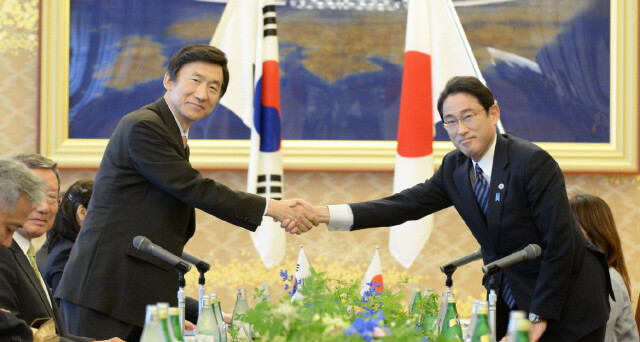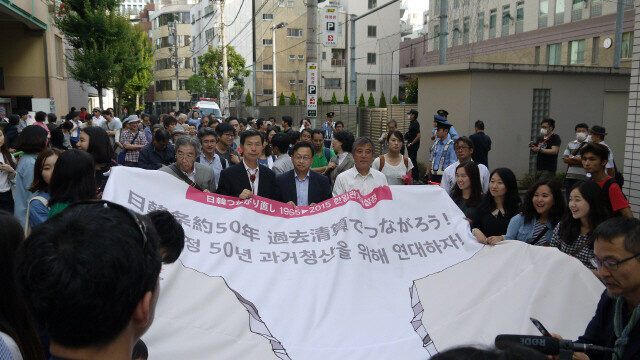hankyoreh
Links to other country sites 다른 나라 사이트 링크
Park and Abe participate in commemorative ceremony, following foreign ministers meeting

After more than three years of conflict over responsibility for the drafting of comfort women and other issues, South Korea and Japan held a foreign ministers’ meeting in Tokyo this week. South Korean President Park Geun-hye and Japanese Prime Minister Shinzo Abe are scheduled to participate in a ceremony to commemorate the 50th anniversary of normalized bilateral relations today.
The moves could signal the possibility of a faster than expected, dramatic improvement, in relations.
South Korean Minister of Foreign Affairs Yun Byung-se sat down with his Japanese counterpart Fumio Kishida at the Japanese Foreign Ministry’s Ikura Guesthouse on the afternoon of June 21 for a roughly 90-minute meeting to discuss major issues such as the comfort women and a possible summit. Yun’s visit was the first by a South Korean Minister of Foreign Affairs in over four years since May 2011.
Such moves are now being taken as a sign that both sides are moving to improve ties in the wake of finance and defense ministers’ meetings last month. The question now is whether they can recover relations from what could be their worst state since their 1965 establishment and guide them smoothly toward normalization with the organization of a summit between South Korean President Park Geun-hye and Japanese Prime Minister Shinzo Abe.
Meeting with reporters on his arrival in Japan on June 21, Yun said he was “planning to speak frankly about a broad range of common interests.”
“This is my first visit to Japan since taking office as Minster of Foreign Affairs, so I see it as holding special meaning,” he added, sending a somewhat ambitious message.
But with many issues remaining for the two sides to agree upon, the outcome of the meeting was mainly an agreement to continue discussions going ahead.
Sources reported little progress at the talks on the issue of the comfort women, which has been the chief stumbling block to date in South Korea-Japan relations. Following eight previous sessions of meetings at the bureau director level, Japan’s plan has been to provide financial support to survivors and have Abe deliver a statement with an apology in exchange for Seoul guaranteeing a “final resolution” on the issue.
But no agreement was ultimately reached on the plan, which would not only have fallen short of South Korean demands for an official acknowledgment of responsibility and compensation from Tokyo, but also Japan’s demand for a halt to regular Wednesday demonstrations by survivors in South Korea and the removal of a statue of a girl which was erected to honor the victims in front of the Japanese embassy in Seoul.
The two foreign ministers also traded viewed on Japan’s current attempts to register as UNESCO World Heritage sites where Koreans were forcibly drafted as workers in the past, including the island of Gunkanjima. Seoul has demanded the addition of information about the wartime drafting of Koreans in the 1930s and 1940s, while Japan has insisted the focus will be on industrial history that predated the Japanese occupation of Korea.
Japan attempted to compromise by accepting some of the South Korean demands at the meeting, sources reported.
Another topic of discussions was the possibility of a bilateral summit, which has yet to take place in the more than two years since President Park took office. To date, Park has maintained that a summit would essentially be conditional on a resolution to the comfort women issue, but recent signs suggest she may be relaxing her hard-line stance. Some are now speculating the discussions at the meeting may have focused on the possibility of the two heads of state naturally meeting at one of several multilateral summits scheduled for the latter half of the year.
South Korean ambassador to Japan Yoo Heung-soo previously responded in the negative when asked in a June 20 interview with Japan’s Mainichi Shimbun newspaper whether a resolution on the comfort women was a prerequisite for a summit.
“But any summit that does take place would have to do so with something of an understanding between the two leaders on this [comfort women] issue,” he added, in what some are taking as an attempt to separate the two issues.
Yoo also offered his personal opinion that the summit should take place “at a multilateral summit meeting such as APEC,” a reference to November’s upcoming APEC Summit in the Philippines.
Meanwhile, the Nikkei reported on June 20 that South Korea and Japan were “considering holding a bilateral summit during their trilateral summit with China between September and November in Seoul, Busan, or Jeju.”
But many hurdles remain to be cleared before a summit or normalization of relations can take place. The key questions look to be whether an agreement acceptable to survivors and the South Korean public can be reached on the comfort women issue, and whether Abe includes a clear message of apology and reflection for Japan’s past aggressions and colonialism in an upcoming statement on Aug. 15.
Meanwhile, far-right Japanese groups staged an anti-Korea demonstration the same day in front of the Ikura Guesthouse where the ministers’ meeting was held. Calling themselves names such as the “Latter-Day Royal Guard,” the roughly 100 demonstrators chanted calls to “take back Dokdo” and “end Japan-Korea relations.”
“We don’t need a Korea that twists the truth about the military comfort women,” some shouted.
The protests led police to set up barricades and control traffic in the area.

By Gil Yun-hyung, Tokyo correspondent, Son Won-je, staff reporter and Seok Jin-hwan, Blue House correspondent
Please direct questions or comments to [english@hani.co.kr]

Editorial・opinion
![[Editorial] Penalties for airing allegations against Korea’s first lady endanger free press [Editorial] Penalties for airing allegations against Korea’s first lady endanger free press](https://flexible.img.hani.co.kr/flexible/normal/500/300/imgdb/original/2024/0502/1817146398095106.jpg) [Editorial] Penalties for airing allegations against Korea’s first lady endanger free press
[Editorial] Penalties for airing allegations against Korea’s first lady endanger free press![[Editorial] Yoon must halt procurement of SM-3 interceptor missiles [Editorial] Yoon must halt procurement of SM-3 interceptor missiles](https://flexible.img.hani.co.kr/flexible/normal/500/300/imgdb/child/2024/0501/17145495551605_1717145495195344.jpg) [Editorial] Yoon must halt procurement of SM-3 interceptor missiles
[Editorial] Yoon must halt procurement of SM-3 interceptor missiles- [Guest essay] Maybe Korea’s rapid population decline is an opportunity, not a crisis
- [Column] Can Yoon steer diplomacy with Russia, China back on track?
- [Column] Season 2 of special prosecutor probe may be coming to Korea soon
- [Column] Park Geun-hye déjà vu in Yoon Suk-yeol
- [Editorial] New weight of N. Korea’s nuclear threats makes dialogue all the more urgent
- [Guest essay] The real reason Korea’s new right wants to dub Rhee a founding father
- [Column] ‘Choson’: Is it time we start referring to N. Korea in its own terms?
- [Editorial] Japan’s rewriting of history with Korea has gone too far
Most viewed articles
- 1Months and months of overdue wages are pushing migrant workers in Korea into debt
- 2Bills for Itaewon crush inquiry, special counsel probe into Marine’s death pass National Assembly
- 31 in 3 S. Korean security experts support nuclear armament, CSIS finds
- 4Trump asks why US would defend Korea, hints at hiking Seoul’s defense cost burden
- 5[Reporter’s notebook] In Min’s world, she’s the artist — and NewJeans is her art
- 6S. Korea discusses participation in defense development with AUKUS alliance
- 760% of young Koreans see no need to have kids after marriage
- 8[Editorial] Penalties for airing allegations against Korea’s first lady endanger free press
- 9[Column] Can Yoon steer diplomacy with Russia, China back on track?
- 10Vietnamese war victims speak of sexual violence by S. Korean troops for the first time